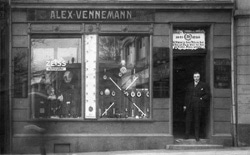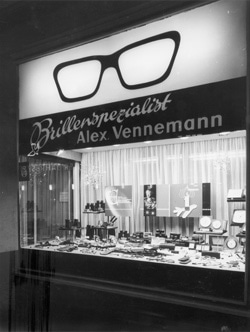

Alexander Vennemann was a mechanic, optician, and dealer of scientific instruments in Aachen during the second half of the 19th century. He founded the city’s first optical workshop and shop for scientific instruments and became renowned as a maker and seller of barometers, thermometers, optical instruments, and other precision devices. The firm Alex. Vennemann operated from the mid-19th century, gained recognition at international exhibitions, and continued to exist (through successors) for more than 170 years.
Alexander Vennemann opened his business on February 15, 1851 – considered the first optical enterprise in Aachen. The shop and workshop were located in the city center, at Friedrich-Wilhelm-Platz 12 (near Elisenbrunnen). Vennemann was a mechanic and optician (Ger. Mechanikus und Optikus), specializing in the production and sale of mathematical, physical, and optical instruments. In the Aachen city directory of 1868 he is listed specifically as “technician of the Royal Verification Commission, mechanic and optician, maker of mathematical, physical, and optical instruments” at Theaterstraße 1.
Among the wide range of his products, barometers were particularly well known, often bearing the mechanic’s signature — “Alex. Vennemann, Aachen”. As an optician, Vennemann likely produced the glass components of instruments, grinding lenses professionally or blowing barometer tubes, while the movements for aneroid barometers were ordered from specialized manufacturers.
In addition to meteorological instruments (barometers, thermometers), Vennemann’s assortment included optical items: spectacles, magnifiers, binoculars, telescopes, microscopes. His enterprise effectively laid the foundation of optical trade in the region. Later descriptions of the firm state that beyond spectacles, one could always find a variety of optical devices for scientific purposes. Being a mechanic, Vennemann also produced instruments for scientific demonstrations.
By the 1870s the firm of Alexander Vennemann had already gained international renown. He took part in world industrial exhibitions, presenting his designs. At the World Exhibition of 1873 in Vienna (Weltausstellung 1873), Vennemann exhibited a “fall machine” and an electromagnetic display. His mention in the official catalogue of the 1873 exhibition confirms that his devices attracted attention at the international level.
In 1878 Alexander Vennemann was awarded honorary silver medals by the city of Aachen and by the city of Antwerp – for his services to clients and the reputation of his business abroad. These awards were probably linked to his participation in international fairs or exhibitions (Antwerp being the nearest large foreign city, where he had many customers). By this time, Alex. Vennemann was serving international clients, as noted in contemporary chronicles.
Vennemann was also officially a mechanic and technician of the Royal Verification Commission of Prussia. This meant he took part in testing and calibrating measuring instruments and held authority in the field of metrology. An interesting fact: he was among the first inhabitants of Aachen to use a generator for producing electric current – in the 1870s Vennemann installed a machine to generate electricity and supplied power to himself and his neighbors. This example demonstrates his technical innovativeness and interest in the latest technologies of the time.
The Vennemann firm became so well known that a public “Wetterhäuschen” – a small weather station with a barometer and other instruments – was installed near his shop by the Elisenbrunnen. For many years it was popular among the townspeople. Unfortunately, during the Second World War in 1943 both the shop and the famous “Wetterhäuschen am Elisenbrunnen” were destroyed in a bombing raid. Yet around the turn of the 20th century such a weather station signified the status of the firm as the city’s leading supplier of precision instruments.
Alexander Vennemann successfully managed his enterprise for almost 30 years. In 1880 he transferred the business to his nephew Johann Frohn. The firm likely continued under the same name (the Vennemann brand already well established). In later directories of the late 19th century one can find references to “Alex Vennemann (Nfg.)” – meaning “successor” of Vennemann – or to the new proprietor’s name. In 1904 the company passed to Ernst Taute, a master optician from Rathenow – a city known as a center of optical industry. Taute continued the family business: in 1921 his son Werner Taute became a partner, and in 1927 the sole owner. Despite the change of family names, the old “Vennemann” label was retained, and the firm remained associated in Aachen with quality optical instruments.
By the mid-20th century the enterprise was still the city’s leading optical store. In 1935, after reconstruction and full electrification, the firm Vennemann supplied about 60% of Aachen’s population with spectacles and other optical products. After the war the shop was revived at a new location and continued its operations. In 1963 it was taken over by Wolfgang Kehrer, in 1999 by Andreas Haveneth, yet the historic name did not disappear. Today the successor of this firm is known as “Augenweide Vennemann” in central Aachen, still offering spectacles and optical instruments, continuing the tradition established by Alexander Vennemann in 1851.
The rich history of Alexander Vennemann’s firm is reflected in numerous old sources. In addition to the already mentioned Aachen city directory (Adressbuch 1868), there are wider commercial and industrial directories. For example, in the all-German directory of merchants and manufacturers (c. 1865–1870) the Vennemann name also appears in the section on scientific instruments, confirming his specialization. Catalogues of international exhibitions (Vienna 1873, etc.) list Vennemann’s exhibits. His instruments can be found in descriptions of museum collections of 19th-century scientific instruments.
Thus, the collected evidence allows us to reconstruct the history of the firm Alexander Vennemann, Aachen. Founded in 1851, it became a pioneer of optical-mechanical trade in the region, flourished in the late 19th century (specializing in barometers, thermometers, spectacles, and scientific instruments), gained international recognition (awards in 1878, participation in the 1873 World Exhibition), and was handed down to successive generations of entrepreneurs. The name “Vennemann” became established as a mark of quality, under which the business continued through the 20th century. Despite wars and changes of ownership, the enterprise survived and still exists today as the oldest optical store in Aachen, preserving the memory of its founder – Alexander Vennemann, scientific instrument dealer of the 19th century.